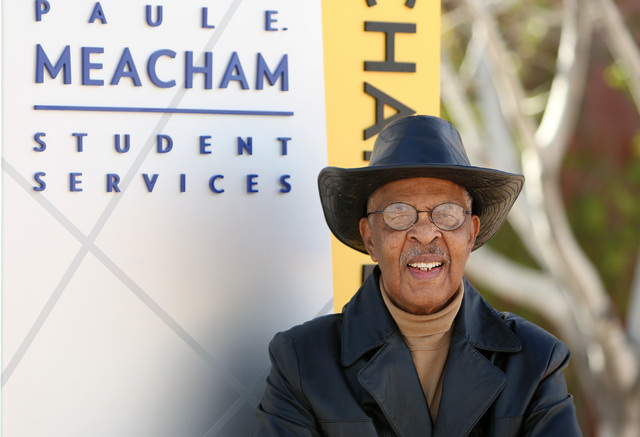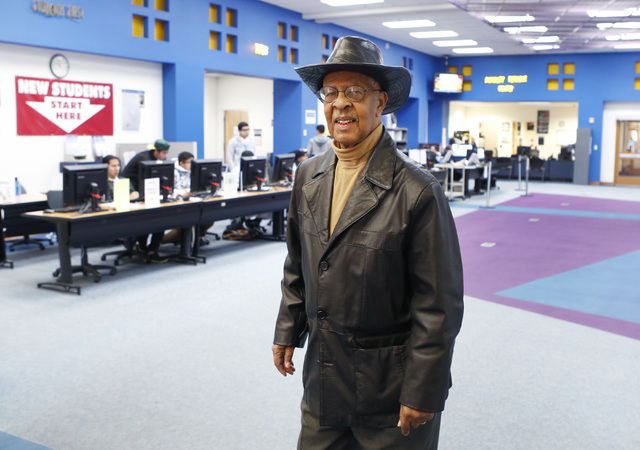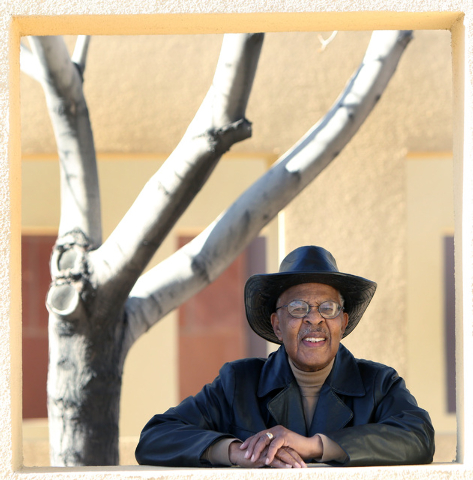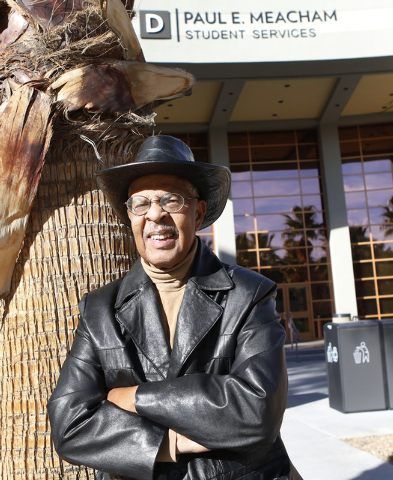CSN names building for former president
Paul Meacham can remember a time when people didn’t think he was the best person to become president of the College of Southern Nevada.
“Some of it was racially charged, I’m sure,” he says. “But most of it was to be expected. You’ll always find people who think there is someone better for the job.”
Meacham is the first African-American to serve as president in the Nevada System of Higher Education, serving 11 years at CSN.
As he had with his previous jobs, Meacham dedicated his career to the students and faculty members of the college.
“Once they realized I was for them, they started to accept me,” he says.
Meacham says that by dealing with the college’s expansion, the influx of students and changes in higher education, he was able to prove he was the best candidate for the job.
Because of his long list of achievements, he is expected to be recognized Friday with the Student Services Building on the West Charleston Campus formally named for him.
“President Meacham changed the lives of thousands of students and his legacy should be promoted in perpetuity,” CSN President Michael D. Richards says. “He’s the reason we have the Charleston campus today. A decade after he retired from CSN, there is no better time to honor Dr. Meacham, his service to CSN, its students and Nevada.”
Meacham is amazed by his achievement.
“Now some of the same people who probably once opposed me (getting appointed) are now excited to see this,” he says.
This moment is a lifetime in the making.
Meacham grew up in Tuscaloosa, Ala., in the ’30s and ’40s.
Being in a house of teachers, which included his aunts, Meacham always knew education was worth pursuing.
And he wanted to pursue it very early. Meacham says he was angry when his 6-year-old brother went off to school.
“I pitched a fit until my aunt said I could go to school, too,” he says.
Since he was two years younger than the required age, his aunt told the teacher to say he was 6 if an administrator came in.
Meacham always knew he would attend college. He started at a community college studying music. He graduated from Tennessee A&I University in Memphis in 1957 with a bachelor’s in music education and moved to Michigan to pursue a master’s in music education.
He then moved back to Memphis to become a junior-high band director.
“Many people would find that age bracket frustrating, but I didn’t at all,” he says. “I wanted to teach young kids the fundamentals of music.”
He stayed in Memphis for nine years. At the time, the area was still struggling with school segregation.
“Plus this is around the time Martin Luther King was killed there,” he says. “(Racial issues were) beginning to disrupt things in the neighborhood.”
On top of that, Meacham knew if he stayed too much longer, he would be stuck.
“They were determined to have me be a band director for the rest of my life,” he says. “I wanted more.”
He began looking at doctoral programs, first in Tennessee and then elsewhere. Meacham began his Ph.D. program at the University of Texas.
“There had never been a black graduate,” he says. “There had only been one woman and one Hispanic.”
Despite the lack of diversity, Meacham says he was treated equally.
“They greeted me mostly with curiosity,” he says.
Though he was one of the last hired from his program, he landed a good job as the special assistant to the vice chancellor of academic affairs for the Dallas County Community College District.
Because it was an affluent area, Meacham says the district was able to carry out many plans.
“They made plans to build seven community colleges,” he says.
Meacham led a task force responsible for all the academic planning related to the development of three of those colleges.
Wanting a change, he moved to become the executive dean of Austin Community College in 1976.
“I went from one of the wealthiest districts to one of the poorest,” he says. “It didn’t matter because I came for the people.”
He stayed seven years, until he heard about an opening at the then-named Community College of Southern Nevada, now called College of Southern Nevada.
He was among many candidates being interviewed for the position but was eventually chosen.
“And all hell broke loose,” he says.
He later found out through an Associated Press story that there was a petition to get his appointment rescinded.
Meacham says it is common for people to get upset at successful job candidates.
“There is always someone who thinks you stole their job,” he says. “But I was qualified for that job. I had the education and the experience for it.”
Meacham persevered in his new role, carrying out what he thought was best for students and faculty and the advancement of higher education.
Over the objections of many people, he argued for the development of the West Charleston campus.
At the time, Meacham says the regents weren’t convinced they needed another campus. On top of that, there was another bid for the undeveloped land, which was purposed to hold a veterans cemetery.
But Meacham stuck to his guns and won the regents over.
One accomplishment he is proudest of, he says, was bringing a chapter of Phi Theta Kappa, the national community college honor society, to the campus. Nevada was the only state that didn’t have a chapter, Meacham says.
Although he loved his work, Meacham took a sabbatical in 1994. When he came back, he decided he wanted to go into the classroom for a while.
In 1995, he started at UNLV as a regents professor, where he was until he retired in 2006.
But being retired has never stopped Meacham from visiting campus. He occasionally comes back to walk the pavement and see how things have changed.
Friday, he will again stroll the West Charleston campus, but this time to be honored for helping bring it about.
“You don’t do the things you do to get a building named for you,” he says. “You do it for the students. You do it because it’s what needs to be done. This is just icing on the cake, and I appreciate the honor.”
Contact reporter Michael Lyle at mlyle@reviewjournal.com or 702-387-5201. Follow @mjlyle on Twitter.

























